

Mathematical Methods for Quantitative Finance. The Mathematical Methods for Quantitative Finance course reviews the mathematical methods fundamental for the study of quantitative and computational finance.

The areas of focus include calculus and multivariable calculus, constrained and unconstrained optimization, and linear algebra. Topics covered include the following: Learn. Coursera.org. Automata. About the Course I am pleased to be able to offer free over the Internet a course on Automata Theory, based on the material I have taught periodically at Stanford in the course CS154.
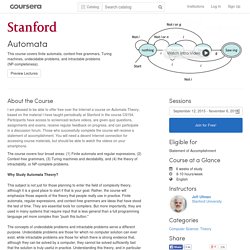
Participants have access to screencast lecture videos, are given quiz questions, assignments and exams, receive regular feedback on progress, and can participate in a discussion forum. Those who successfully complete the course will receive a statement of accomplishment. You will need a decent Internet connection for accessing course materials, but should be able to watch the videos on your smartphone.
The course covers four broad areas: (1) Finite automata and regular expressions, (2) Context-free grammars, (3) Turing machines and decidability, and (4) the theory of intractability, or NP-complete problems.Why Study Automata Theory? This subject is not just for those planning to enter the field of complexity theory, although it is a good place to start if that is your goal. Model Thinking. This course will consist of twenty sections.
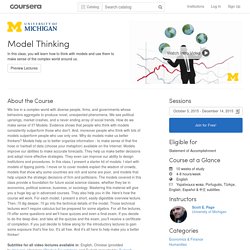
As the course proceeds, I will fill in the descriptions of the topics and put in readings. Section 1: Introduction: Why Model? In these lectures, I describe some of the reasons why a person would want to take a modeling course. These reasons fall into four broad categories: A Beginner's Guide to Irrational Behavior. An Introduction to Interactive Programming in Python. Coursera.org. Coursera.org. Neural Networks for Machine Learning. About the Course Neural networks use learning algorithms that are inspired by our understanding of how the brain learns, but they are evaluated by how well they work for practical applications such as speech recognition, object recognition, image retrieval and the ability to recommend products that a user will like.
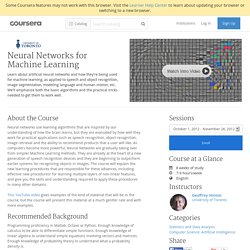
As computers become more powerful, Neural Networks are gradually taking over from simpler Machine Learning methods. They are already at the heart of a new generation of speech recognition devices and they are beginning to outperform earlier systems for recognizing objects in images. Game Theory. About the Course Popularized by movies such as "A Beautiful Mind", game theory is the mathematical modeling of strategic interaction among rational (and irrational) agents.
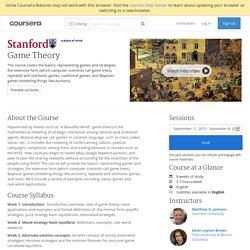
Beyond what we call 'games' in common language, such as chess, poker, soccer, etc., it includes the modeling of conflict among nations, political campaigns, competition among firms, and trading behavior in markets such as the NYSE. How could you begin to model eBay, Google keyword auctions, and peer to peer file-sharing networks, without accounting for the incentives of the people using them? Coursera.org. Social and Economic Networks: Models and Analysis. About the Course Social networks pervade our social and economic lives.
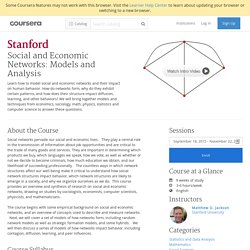
They play a central role in the transmission of information about job opportunities and are critical to the trade of many goods and services. They are important in determining which products we buy, which languages we speak, how we vote, as well as whether or not we decide to become criminals, how much education we obtain, and our likelihood of succeeding professionally. The countless ways in which network structures affect our well-being make it critical to understand how social network structures impact behavior, which network structures are likely to emerge in a society, and why we organize ourselves as we do. Coursera.org. Coursera.org. About the Course If you had been alive at the start of the eighteenth century, your material well-being would have been much the same whichever region of the world you lived in, and it would almost certainly have been a precarious existence.

Go back 300 years before the eighteenth century, and not much was different. But come forward 300 years to the present, and we see a startling transformation. Incomes in some parts of the world have increased more than ten-fold; and now it most certainly does matter where you live – with income differentials of 50 times between the world’s richest and poorest countries. What has changed in the past 300 years is the development and application of new technologies at a pace unprecedented in human history – the steam engine, electricity and the computer, to name just a few. Course image: Copyright JL Brown. Coursera.org. In this course, we will examine the main bodies of economic theory that have been used to guide economists’ and policy makers’ understanding of the macroeconomy.
Macroeconomics is a word derived from the Greek prefix “makros”, meaning large. It is the study of economic aggregates, of national and international economies and of the economic management role played by governments and international organisations. Coursera.org. Unpredictable? Randomness, Chance and Free Will. Metadata: Organizing and Discovering Information. Bioinformatics Algorithms (Part 1) Competitive Strategy. Design Thinking for Business Innovation. Human Evolution: Past and Future. Financial Engineering and Risk Management Part I. Financial Engineering and Risk Management Part II.
The Power of Markets. History and Future of (Mostly) Higher Education. About the Course Welcome!

Coursera.org. Unethical Decision Making in Organizations. Coursera.org. About the Course The path for entrepreneurs to grow their companies outside of well-developed entrepreneurial ecosystems like Silicon Valley is challenging.
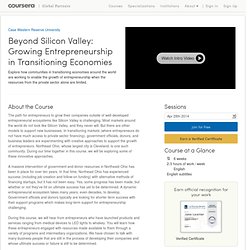
Most markets around the world do not look like Silicon Valley, and they never will. But there are other models to support new businesses. In transitioning markets (where entrepreneurs do not have much access to private sector financing), government officials, donors, and business leaders are experimenting with creative approaches to support the growth of entrepreneurs. Northeast Ohio, whose largest city is Cleveland, is one such community. A massive intervention of government and donor resources in Northeast Ohio has been in place for over ten years. During this course, we will hear from entrepreneurs who have launched products and services ranging from medical devices to LED lights to whiskey. Coursera.org. About the Course Knowing where things are is effortless.
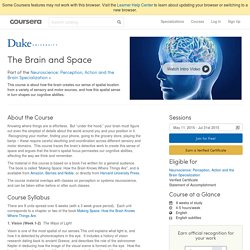
But “under the hood,” your brain must figure out even the simplest of details about the world around you and your position in it. Recognizing your mother, finding your phone, going to the grocery store, playing the banjo – these require careful sleuthing and coordination across different sensory and motor domains. This course traces the brain’s detective work to create this sense of space and argues that the brain’s spatial focus permeates our cognitive abilities, affecting the way we think and remember. The material in this course is based on a book I've written for a general audience. The course material overlaps with classes on perception or systems neuroscience, and can be taken either before or after such classes. Coursera.org. About the Course In this course we will ask you to form groups with other MOOC participants to identify an opportunity to create social change, develop a business model, and outline ideas in a business plan, which you will in the end submit to possibly receive start-up funding.
The domain of social change is no longer reserved for students of political sciences and development studies. Increasingly business graduates are recognized as possessing important skills that can drive social change. This new discipline is often referred to as Social Entrepreneurship (S-ENT). Beginning Game Programming with C# About the Course The Beginning Game Programming with C# course is all about learning how to develop video games using the C# programming language.
Why use C# instead of C++, Java, ActionScript, or some other programming language you may have heard of? Beginning Game Programming with C# Coursera.org. Coursera.org. Computational Methods for Data Analysis. Computing for Data Analysis. Coursera.org. Machine Learning. Machine learning is the science of getting computers to act without being explicitly programmed.
In the past decade, machine learning has given us self-driving cars, practical speech recognition, effective web search, and a vastly improved understanding of the human genome. Machine learning is so pervasive today that you probably use it dozens of times a day without knowing it. Many researchers also think it is the best way to make progress towards human-level AI.